TinkerMill is a community of people with a vast range of interests that are represented by the shops we maintain. Each is run by members of TinkerMill who volunteer their time, energy, and skills putting together a shop, operating it, training new members and the public in how to use the tools, and develop the skills needed to create with those tools. They are the ‘Shop Captain’.
We have the shops that we do because our members want them to be here. Below are the shops we have currently.
*Click on the hyperlink for each shop to find more details including classes offered, Shop Captains, and more!
Shops you’ll find at TinkerMill today:
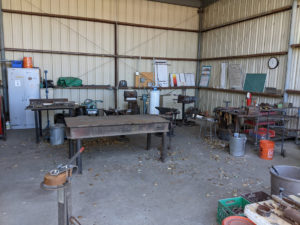 The blacksmithing shop is located in the back bay area adjacent to the welding shop. We have a lot of the traditional equipment found in a blacksmith shop.
The blacksmithing shop is located in the back bay area adjacent to the welding shop. We have a lot of the traditional equipment found in a blacksmith shop.
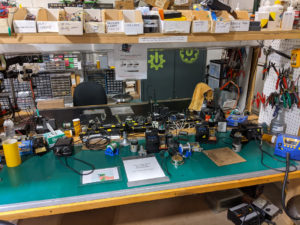 TinkerMill’s Electronics Shop has a well equipped area for member use. Long time members with many small projects, or product developers doing something absolutely new – gather in the TinkerMill Electronics Area. More than just the availability of technology for testing, there are like minded interesting people to find collaboration with. With an open layout, people ‘working’ in electronics are in visual and verbal communication with other unrelated areas. Electronics is bordered by the metalwork area and the overhead doors in the Main Space. It is the first area past the entry.
TinkerMill’s Electronics Shop has a well equipped area for member use. Long time members with many small projects, or product developers doing something absolutely new – gather in the TinkerMill Electronics Area. More than just the availability of technology for testing, there are like minded interesting people to find collaboration with. With an open layout, people ‘working’ in electronics are in visual and verbal communication with other unrelated areas. Electronics is bordered by the metalwork area and the overhead doors in the Main Space. It is the first area past the entry.
Test Equipment
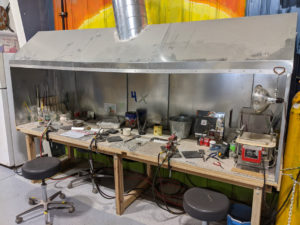 Flameworking uses a torch to heat up glass to make it molten. In that soft state you work the glass with tools and glass to create art.
Flameworking uses a torch to heat up glass to make it molten. In that soft state you work the glass with tools and glass to create art.
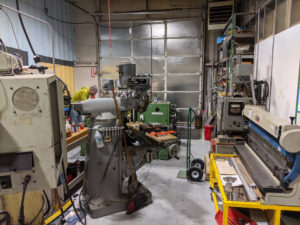
TinkerMill’s machine shop is a great place for shaping metal and some plastics in a controlled way.
Some equipment we have-
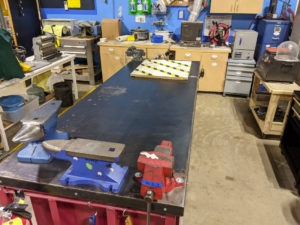
Our Metalcraft, Jewelry, and Lapidary Shop is dedicated to working with non-ferrous metals to craft jewelry, art, and other relatively small items. Metals that can be used in this shop are brass, bronze, copper, silver, and gold. (Steel, titanium, paladium, aluminum, platinum, and other metals are currently not supported in this shop.)
Here is a short list of both decorative and functional skills you can learn and practice at our shop:
Please come, learn, and create something cool at the Metalcraft and Jewelry Open Studio. The Open Studio is perfect for exploring the shop, getting acquainted with others with similar interests, and asking questions. Do you have a craft or piece of jewelry you’d like to make using metal, but not sure how to begin? Someone with experience will be around to help you get familiar with the tools available and how to use them. The Open Studio is very informal but please use the Meetup calendar to verify the next Open Studio date and sign-up to let the shop captain(s) know you are coming.
For more information about the Metalcraft, Jewelry & Lapidary Shop, please visit our page on the TinkerMill Wiki.
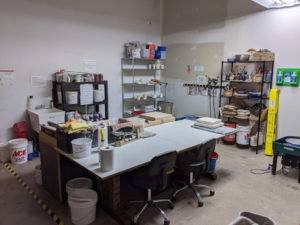 Our pottery studio is a cooperative space where we as a community strive to maintain a functional and safe environment. We have wheels, hand building tools, clay, glaze, and kilns.
Our pottery studio is a cooperative space where we as a community strive to maintain a functional and safe environment. We have wheels, hand building tools, clay, glaze, and kilns.
Respect for each other, the studio, and Tinkermill as a whole is very important.
With that in mind, we ask that you read and agree to the General Studio Policies.
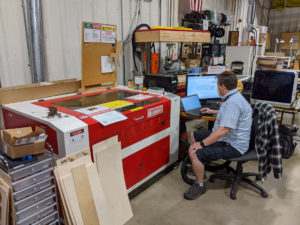 Rapid prototyping is a group of techniques used to quickly fabricate a scale model of a physical part or assembly using CAD – CAM (Computer Aided Design – Computer Aided Manufacture) data.
Rapid prototyping is a group of techniques used to quickly fabricate a scale model of a physical part or assembly using CAD – CAM (Computer Aided Design – Computer Aided Manufacture) data.
TinkerMill currently has a wide variety of rapid prototyping capabilities, including:
3D Printers
Laser Cutter
ShopBot
Vacuum Former
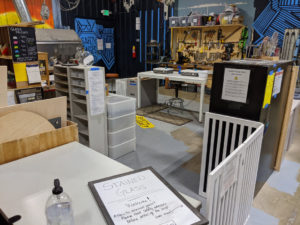 The stained glass shop is in the main building, and is home to a variety of glass making tools.
The stained glass shop is in the main building, and is home to a variety of glass making tools.
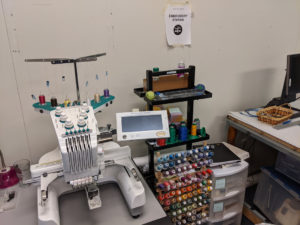
The Textiles Shop at TinkerMill is one of the best sewing and fabric arts maker space shops in Colorado. We provide equipment, hand tools, and basic supplies to support home sewing, industrial sewing, machine embroidery, upholstery, clothing care, and general fabric and textiles crafts. We have a clean, comfortable, dedicated room specifically for textiles work. The centerpiece of our shop is a large, 8′ x 5′ cutting table with gridlines and self-healing cutting surface. We have a variety of home sewing machines, sergers, embroidery machines, and industrial sewing machines.
Our shop is open to TinkerMill members and non-members alike. Non-members are welcome to use the shop but must be accompanied by a member. The computerized embroidery machines, industrial sewing machines, and the heat press require training before use. The home sewing machines, sergers, and all hand tools are available for anyone to use at any time.
For more information about the Textiles Shop, its equipment, and usage policies, please visit the Textiles Shop Wiki Page.
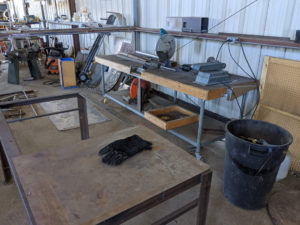 The welding shop at TinkerMill is located in the back bay area. We have a MIG, a TIG, and variety of other metal working tools. Classes are offered regularly! Become a member and use the shop independently after certification!
The welding shop at TinkerMill is located in the back bay area. We have a MIG, a TIG, and variety of other metal working tools. Classes are offered regularly! Become a member and use the shop independently after certification!
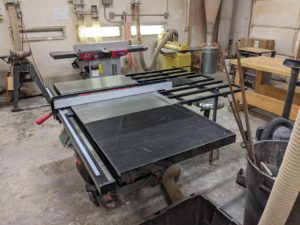
The Woodshop is built on the idea that anyone can learn woodworking and some people have varying levels of previous experience. There is online required homework prior to taking the wood shop classes. Please take them in any order you are comfortable with. Classes are taught by volunteers and are scheduled based on volunteer availability. We attempt to offer Wood Shop 101, Wood Shop 201, and Saw Stop Certification at least once a month. Click here for more details.
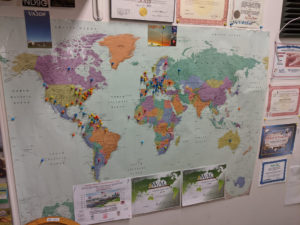
Tinkermill’s HAM Radio has the best station inside the Longmont City limits for working DX and is definitely within the top 10 stations in Boulder county in that regard.
The main antenna is a Mosley Pro-67 mounted at 65 feet on a Rohn-25G tower. This antenna covers 40m (3el), 30m (1el), 20m (3el), 17m (2el), 15m(3el), 12m (2el) and 10m (4el). The antenna is turned with a Yaesu G2800 rotor. We also have 2 dipole antennas for 80 amd 160m.
The shack is continually under construction and the next steps would be to add remote control for antenna switching and rotor control. We also need to get 208V installed to run an amplifier.
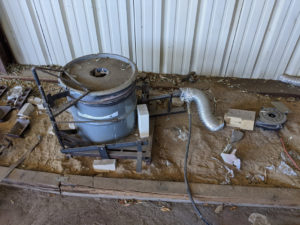
The foundry can used to cast aluminum using a sand cast mold system.
To use the foundry independently, two people must be present. Both the person pouring and the person who is the safety backup person must have completed the safety certification course.
To be fully certified, the certification class and four independent pours are required. Often these can happen during the certification class. If not, there are always pour times set up at the end of every certification class for this purpose.
TinkerMill has a small paint booth to finish your creations. We limit the material to latex based finishes.
© 2021 All rights reserved
TinkerMill is a Colorado 501(c)(3) Non-Profit Corporation.